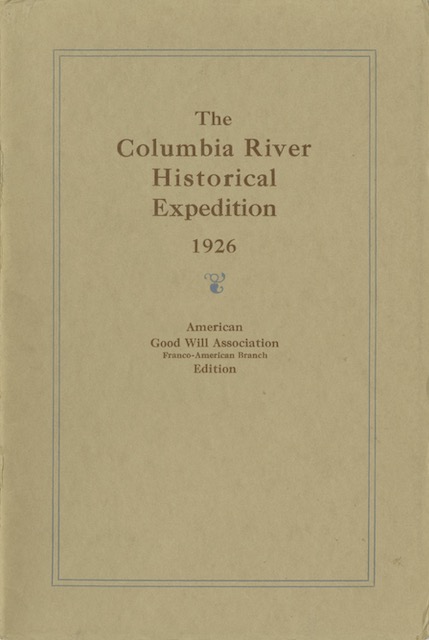Ostensibly published by the Franco-American Branch of the American Good Will Association, this booklet promotes the 1926 Columbia River Historical Expedition. The booklet claims the trip was “being organized under the leadership of” the governors of Minnesota, North Dakota, Montana, Idaho, Washington, and Oregon.
 Click image to download a 6.8-MB PDF of this 36-page booklet.
Click image to download a 6.8-MB PDF of this 36-page booklet.
In fact, the trip was organized by the Great Northern Railway under the leadership of Ralph Budd. Budd modestly kept his name out of this and most other expedition materials and this booklet mentions the Great Northern only twice (plus a logo on the back cover). Budd clearly wanted to spread “ownership” of the expedition to as many people as possible to gain their participation and support.
The American Good Will Association grew out of efforts to help Europe in general and France in particular rebuild after the Great War. It started out as the American Committee for Devastated France, which raised about $4.3 million (some $65 million in today’s money) for humanitarian efforts.
As the committee’s work wound down, its leaders decided that Americans should maintain personal ties with Europeans, so they formed the Good Will Association. As the booklet says, the purpose of the Good Will Association was “to further knowledge and understanding between the people of the United States and the people of France.” As near as I can tell, there were no branches of the association other than the Franco-American branch.
Although I haven’t found any evidence that Ralph Budd was involved in the humanitarian efforts, he was a charismatic man and frequently gave speeches about the history of the Northwest, including early expeditions by French explorers. Somewhere, Budd encountered the Good Will Association and talked them into covering the expedition costs of U.S. high school students and similarly aged students from France.
Students were selected by participation in an oratorical contest about French contributions to the development of the United States and these contests were held in cities where the Good Will Association could find local sponsors. The booklet notes that the “oratorical contest study of ‘The French Pioneers in America’ is an important part of [the Good Will Association’s] program for the present year.”
A total of 39 U.S. and 5 French students won the right to go on the trip. The expedition fares for all of these students would have been about $10,300 or around $180,000 in today’s money. Sponsors probably also paid the cost of travel between the students’ homes and Chicago, where the expedition began and ended.
In addition to describing the expedition, this booklet gives short biographies of 20 French explorers who visited the Northwest between about 1634 and 1840. It also has two pages of reference books about the history of the French in America.
This booklet doesn’t seem to be advertising the expedition itself. Instead, I suspect it was used to inspire students to enter the contest and provide them with some starting research materials. It was probably also given to potential donors to the Good Will Association, which was asking its members in various parts of the country to sponsor two students each.
